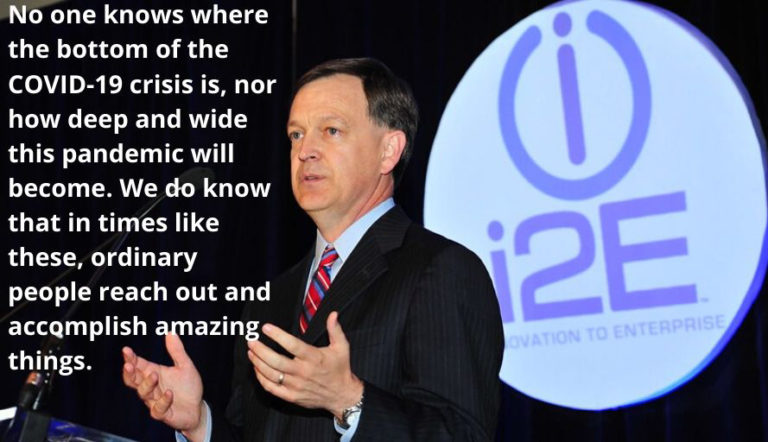By Scott Meacham
The COVID-19 medical and economic crisis is relentless. Every day more people, locations and institutions are impacted. Scientists and other experts are appropriately realistic. Matters are likely to worsen, at least near-term, before we flatten the curve of infection.
Our hearts go out to the sick and their families. We send everlasting gratitude to the heroes of this situation wherever they are—the medical professionals, first responders, volunteers, and workers in critical industries who are selflessly putting the good of the whole ahead of their own self-interest.
For these heroes, it’s a brutal, all-consuming battle on the front lines of this crisis. While they fight for swabs and masks and people’s lives, there’s a parallel battle going on. Powerful forces — compassion, collaboration, and ingenuity—are at work to lessen the burden of those who are suffering and to prevent a crisis like this from happening again, at least in the same way.
In labs and hospitals all over the world, researchers and scientists are working 24/7 to create faster, more predictive medical tests, preventions, and cures. There are companies that are creating entirely new processes to ship and deliver goods to a world that is far less mobile than before.
Whole industries are changing before our eyes. Physicians and insurers who may have been reluctant before are embracing the touch and efficiency of telemedicine. Distillers are making hand sanitizer. Supply chains are being reworked. Entrepreneurs are applying machine learning and the Internet of Things (IoT) to solve crushing problems that didn’t exist 90 days ago.
Inertia — not lack of capital, not a shortage of talent, not regulation — is the biggest enemy of entrepreneurship and innovation. In the throes of a crisis like this, any appetite for inertia is wiped out. A compelling urge to find and fix is upon all of us — and that means opportunity, in the best sense of the word.
Consider this example. James Dyson, inventor of the world’s first bagless vacuum cleaner, leads a billion dollar self-made global technology enterprise. In the last three weeks, Dyson’s company has invented a brand new ventilator to meet the specific needs of COVID-19 patients. The plan is to produce 15,000 of these ventilators by April.
Will this ventilator do the job? Will its manufacture be easy and quick enough to save lives now? Who knows? But it’s a remarkable effort led by a bold and proven inventor who believes that he and his company can save lives in the next 30 days.
No one knows where the bottom of the COVID-19 crisis is, nor how deep and wide this pandemic will become before we start to climb toward a new normalcy. We do know, however, that adversity makes us stronger. In times like these, ordinary people reach out and accomplish amazing things.
Initially, this pandemic may have a chilling effect on startup activity in general. But new ideas will surface. Entrepreneurs early in their careers (like Dyson was 20-plus years and 5,127 vacuum prototypes ago) will come to the front with ideas that markets, customers and investors will consider.
Pandemics produce extreme change. However, the spirit of problem-solving and entrepreneurship is contagious, too.
Scott Meacham is president and CEO of i2E Inc., a nonprofit corporation that mentors many of the state’s technology-based startup companies. Contact Meacham at [email protected].









